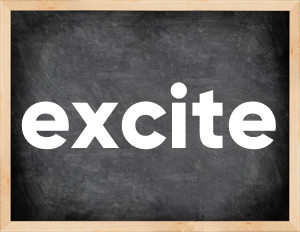 The English verb 'excite' is pronounced as [ɪkˈsaɪt].
The English verb 'excite' is pronounced as [ɪkˈsaɪt].
Related to:
regular verbs.
3 forms of verb excite: Infinitive (excite), Past Simple - (excited), Past Participle - (excited).
Here are the past tense forms of the verb excite
👉 Forms of verb excite in future and past simple and past participle.
❓ What is the past tense of excite.
Excite: Past, Present, and Participle Forms
| Base Form | Past Simple | Past Participle |
|---|---|---|
| excite [ɪkˈsaɪt] |
excited [ɪkˈsaɪtɪd] |
excited [ɪkˈsaɪtɪd] |
What are the 2nd and 3rd forms of the verb excite?
🎓 What are the past simple, future simple, present perfect, past perfect, and future perfect forms of the base form (infinitive) 'excite'?
Learn the three forms of the English verb 'excite'
- the first form (V1) is 'excite' used in present simple and future simple tenses.
- the second form (V2) is 'excited' used in past simple tense.
- the third form (V3) is 'excited' used in present perfect and past perfect tenses.
What are the past tense and past participle of excite?
The past tense and past participle of excite are: excite in past simple is excited, and past participle is excited.
What is the past tense of excite?
The past tense of the verb "excite" is "excited", and the past participle is "excited".
Verb Tenses
Past simple — excite in past simple excited
(V2).
Future simple — excite in future simple is excite (will + V1).
Present Perfect — excite in present perfect tense is
excited
(have/has + V3).
Past Perfect — excite in past perfect tense is
excited
(had + V3).
excite regular or irregular verb?
👉 Is 'excite' a regular or irregular verb? The verb 'excite' is regular verb.
Examples of Verb excite in Sentences
- We were so excited to meet the captain (Past Simple)
- I've been excited five times! (Present Perfect)
- This book has excited very few comments. (Present Perfect)
- The children were excited with our announcement. (Past Simple)
- It was a performance that could excite a feeling of pity even in the most severe person. (Past Simple)
- Technically, his performance is great, but it doesn't excite me. (Present Simple)
- This trial has excited great public interest. (Present Perfect)
- Playing a man, he tried to excite her with the help of horse hormones. (Past Simple)
- His freedom of expression, especially on matters prohibited by Islamic moral norms, continues to excite religious censors. (Present Simple)
- Maybe you are looking for something that can excite you? (Present Simple)